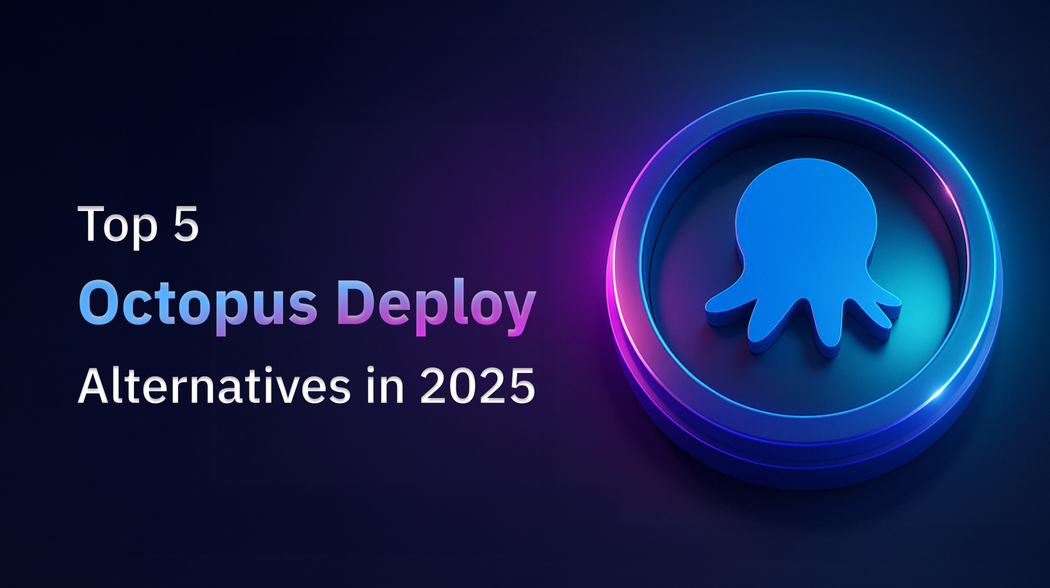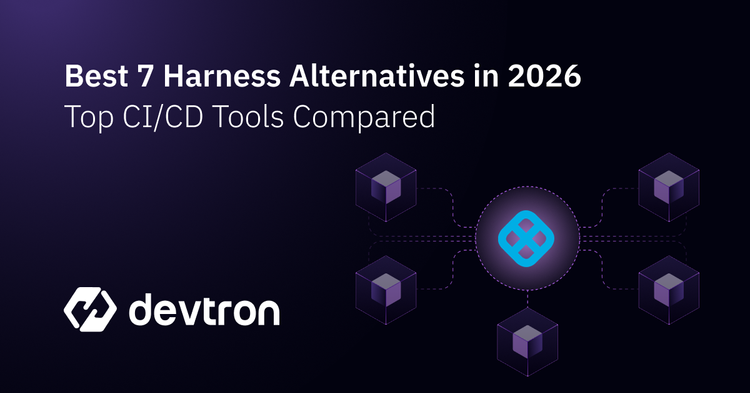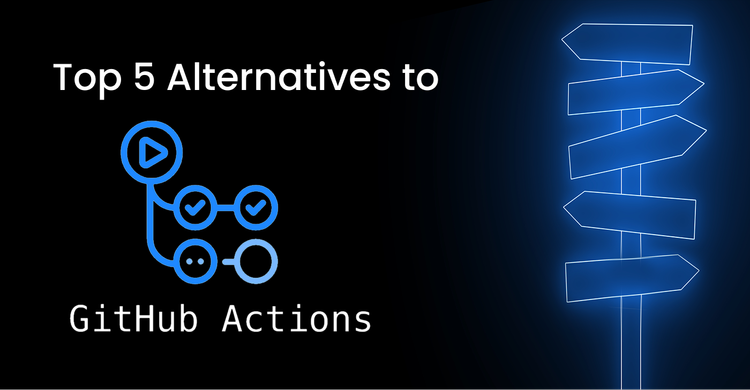Octopus Deploy is a deployment automation tool designed to simplify and streamline the software release process. It enables teams to deploy applications consistently and reliably across various environments, such as development, testing, staging, and production.
Whether you're facing issues with Octopus Deploy’s complexity, pricing models or are simply evaluating options, this guide highlights the top 7 Octopus Deploy alternatives to consider in 2025, covering both open-source and commercial tools.
Why look for an Octopus Deploy Alternative?
Octopus Deploy provides a great solution for deployments, but it does not cover all the aspects of the Software Development Lifecycle. There are a few reasons why you might want to look for an alternative to Octopus Deploy.
- Limited to Deployments: Octopus Deploy is limited to creating and managing Deployments. It does not create a CI pipeline. For creating the CI pipelines, a different tool, such as Jenkins or CircleCI, will have to be introduced, which can lead to tool sprawl.
- Cost: For large teams that have to work with multiple different projects, the cost of using Octopus Deploy can get very high.
- Vendor Lock-in: Proprietary tools like Octopus Deploy can make migration to other platforms challenging. Teams with a preference for open-source tools, such as ArgoCD or Spinnaker, may want alternatives for flexibility and community support.
- Not Kubernetes native: Octopus Deploy is a general-purpose deployment tool, so its Kubernetes features may not feel as seamless or intuitive as tools purpose-built for Kubernetes
Key Evaluation Criteria for Kubernetes CI/CD Tools
Before you go ahead to look at Octopus Deploy alternatives, let’s first understand the criteria on which the tools should be evaluated.
- Kubernetes Native Support: The tools should easily integrate with the Kubernetes cluster and allow you to update resource configuration for multiple environments and see the health of deployed resources.
- Native GitOps Support: GitOps is widely used for managing deployments and avoiding drift. The CI tool should have native support for deploying with GitOps
- Scalability: As Kubernetes is designed to scale to huge numbers, the CI tool should be able to keep up with this scale and run multiple builds every day
- Team Collaboration: The CI/CD tools should natively allow teams to collaborate on the pipelines.
- Access Control: The tools should have a robust access control management system to ensure that unauthorized users cannot change the pipeline configuration
- Security: The pipelines should have native security integrations to ensure that the build code and artifacts are secure before deploying to Kubernetes.
Top 7 Octopus Deploy Alternatives
Devtron
Devtron is a Kubernetes-native DevOps platform that offers built-in GitOps capabilities, visual dashboards, and seamless CI/CD integration. It goes beyond simple CI/CD pipelines and offers advanced deployment and Kubernetes management capabilities such as:
- Visual workflow builder for pipelines
- Built-in GitOps and release orchestration
- Role-based access control and audit logs
- Multi-cluster management
- Easy onboarding for DevOps and developers
Best for: Teams looking for an opinionated, scalable GitOps solution with a UI-rich experience.
Argo CD
ArgoCD is a Kubernetes-native GitOps continuous delivery tool designed to manage applications declaratively. It ensures your applications remain in sync with their Git repositories, offering unparalleled control and automation. ArgoCD provides advanced features such as:
- Declarative GitOps-based deployment
- Automated drift detection and synchronization
- Support for multiple Git repositories and applications
- Integrated RBAC and security policies
- Real-time application health monitoring
Best for: Teams seeking a GitOps-based CD solution to integrate into existing CI workflows for Kubernetes clusters.
Codefresh
Codefresh is a GitOps-centric CI/CD platform designed for modern application delivery, particularly for Kubernetes and cloud-native workflows. It integrates seamlessly with Git repositories, enabling automated deployments and application lifecycle management with simplicity and scalability.
- Simplifies continuous delivery using GitOps principles for Kubernetes environments.
- Flexible pipelines for building, testing, and deploying containerized applications.
- Visualize builds, deployments, and cluster activity in real-time.
- Optimized for managing Kubernetes clusters and Helm releases.
Best for: Teams looking for a streamlined GitOps-based CI/CD solution with Kubernetes-native features and comprehensive deployment automation.
Flux CD
Flux CD is a lightweight, Kubernetes-native GitOps tool designed for continuous and automated application deployment. It keeps Kubernetes clusters in sync with Git repositories, enabling simple and reliable operations at scale. Key features include:
- GitOps-based deployment for Kubernetes
- Automated updates to container images and manifests
- Multi-tenancy support with minimal overhead
- Easy integration with existing CI/CD workflows
- Secure and auditable application management
Best for: Teams seeking a lightweight, GitOps-driven solution for automated Kubernetes application deployment.
Azure DevOps
Azure DevOps is a comprehensive suite of development tools by Microsoft, offering services for CI/CD, project management, and collaboration. It provides pipelines for building, testing, and deploying applications across various environments, including Kubernetes, virtual machines, and cloud platforms.
- Fully customizable CI/CD pipelines support multi-platform deployments, including containers and Kubernetes.
- Seamless integration with Azure services like Azure Kubernetes Service (AKS), Azure Functions, and Azure App Services.
- Includes tools for version control (Azure Repos), project management (Azure Boards), and artifact storage (Azure Artifacts).
- Built-in capabilities for vulnerability management and secure code scanning.
- Deploy to any platform, including AWS, GCP, and private data centers.
Best for: Teams seeking an all-in-one DevOps platform with powerful CI/CD and Kubernetes integration.
GitHub Actions
GitHub Actions is a flexible CI/CD and automation tool tightly integrated with GitHub repositories. It enables teams to build, test, and deploy applications across various environments, including Kubernetes, directly from their codebase. Key features include:
- Native integration with GitHub for streamlined workflows
- Support for Kubernetes deployments via custom actions
- An extensive marketplace for reusable workflows and actions
- Scalable and customizable automation for CI/CD pipelines
- Built-in security and compliance with code scanning tools
Best for: Teams already using GitHub looking for a seamless, repository-integrated CI/CD solution with Kubernetes deployment capabilities.
AWS Code Pipeline
AWS CodePipeline is a fully managed CI/CD service that automates application builds, tests, and deployments across AWS environments, including Kubernetes. Designed for scalability and flexibility, it integrates seamlessly with other AWS services. Key features include:
- Native integration with Amazon EKS for Kubernetes workflows
- Automated deployment pipelines with flexible triggers
- Prebuilt integrations with popular CI/CD and DevOps tools
- Fine-grained control through AWS IAM policies
- High availability and scalability for enterprise-grade operations
Best for: Teams deeply invested in the AWS ecosystem seeking a Kubernetes-compatible CI/CD solution tailored for AWS services.
Devtron vs Octopus Deploy: A Quick Comparison
| Feature | Devtron | Octopus Deploy |
|---|---|---|
| Kubernetes-Native | Built specifically for Kubernetes with native support for Helm, manifests, and GitOps. | Supports Kubernetes but not Kubernetes-native; relies on general-purpose deployment models. |
| GitOps Integration | Strong GitOps principles with native syncing and reconciliation. | Limited GitOps support; lacks automatic syncing with Git repositories. |
| Multi-cluster Support | Centralized dashboard for managing multiple Kubernetes clusters. | Supports multi-cluster deployments but lacks deep visualization. |
| CI/CD Integration | Native + Pluggable | No CI support. Only CD support for Kubernetes. |
| Deployment Strategies | Advanced strategies like Canary, Blue/Green, and Progressive rollouts. | Supports custom deployment strategies, but requires manual configuration. |
| Learning Curve | Easy onboarding | Steep for beginners |
Conclusion
While Octopus Deploy offers a reliable solution for managing deployments, it has certain limitations when it comes to Kubernetes-specific workflows. There are several alternatives to Octopus Deploy, such as Devtron, that enable you to seamlessly create CI/CD pipelines tailored for Kubernetes clusters and streamline the deployment process with ease.
Devtron vs. the Rest: See How We Compare
Making a switch? Discover how Devtron measures up to today’s top DevOps tools.
1. Top 5 Alternatives to GitHub Actions
2. Top 5 Alternatives to Rancher
3. Top 5 Alternatives to GitLab
4. Top 5 Alternatives to Jenkins
5. Top 7 CircleCI Alternatives
6. Top 5 Argo CD Alternatives
7. Top 5 Alternatives to Kubernetes Dashboard
FAQ
Is Octopus Deploy still a good option in 2025?
Yes, Octopus Deploy is still a good option in 2025 for hybrid environments needing robust deployment automation. However, for Kubernetes-native or GitOps-focused workflows, alternatives like Devtron or ArgoCD may be more efficient, cost-effective, and aligned with modern practices.
Can Devtron fully replace Octopus Deploy?
Yes. Devtron provides CI/CD with GitOps, RBAC, and observability in one Kubernetes-native platform.
What is the best alternative to Octopus Deploy for multi-cluster setups?
Devtron and Azure DevOps are strong options for managing multi-cluster environments.
Is Devtron open source?
Yes, Devtron is open-source with enterprise-grade capabilities available via paid tiers.







